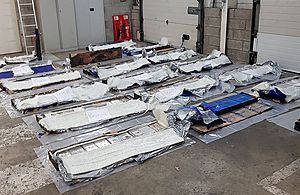260 kilos of cocaine seized by Border Force at Coquelles
News story
Border Force officers at Coquelles have prevented an attempt to smuggle more than 260 kilos of cocaine into the UK in a lorry.

The seizure, which had a potential street value of around £20 million, happened on 28 April at the juxtaposed controls at Coquelles, France. Officers intercepted a lorry in the UK controlled zone at the port which was found to contain a consignment of car parts. A number of plywood boxes were found within the load which contained more than a quarter of a tonne of cocaine.
Chris Philp, Minister for Immigration Compliance said:
This seizure has taken millions of pounds worth of cocaine out of the hands of organised criminals and off our streets.
Drugs are currency for organised gangs and are intrinsically linked to crime, violence and exploitation which is why we will do all we can to stop drug traffickers and bring them to justice.
Following the 28 April seizure the driver of the lorry, a Romanian national, was arrested on suspicion of importing Class A drugs and the investigation was passed to the National Crime Agency (NCA). The driver was later released under investigation.
NCA Dover branch commander Martin Grace said:
We know that international OCGs remain criminally active and despite the restrictions on movement brought about by coronavirus.
As a result of joint working between the NCA and our Border Force partners, attempts to smuggle significant quantities of drugs have been thwarted before creating harm to our communities in the UK.
Border Force officers use hi-tech search equipment to combat immigration crime and detect banned and restricted goods that smugglers attempt to bring into the country.
Anyone with information about activity they suspect may be linked to smuggling should call Crimestoppers on 0800 555 111 or go to https://www.gov.uk/report-smuggling.
Published 5 May 2020